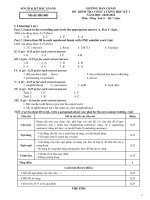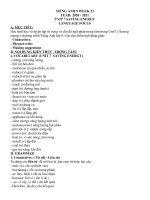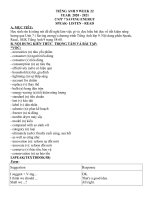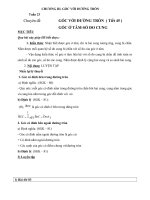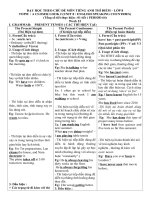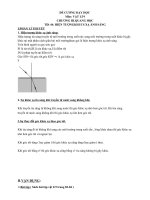ĐỀ CƯƠNG HƯỚNG DẪN TỰ HỌC TIẾNG ANH 9 - HỆ 7 NĂM
Bạn đang xem bản rút gọn của tài liệu. Xem và tải ngay bản đầy đủ của tài liệu tại đây (115.05 KB, 3 trang )
<span class='text_page_counter'>(1)</span><div class='page_container' data-page=1>
<b>TIẾNG ANH 9 WEEK 22</b>
<b>YEAR: 2020 - 2021</b>
<i><b>UNIT 7 SAVING ENERGY</b></i>
<b>SPEAK- LISTEN - READ </b>
<b>A. MỤC TIÊU:</b>
Học sinh rèn kỉ năng nói để đề nghị làm việc gì và đọc hiểu bài đọc về tiết kiệm năng
lượng qua Unit 7 ( Saving energy) chương trình Tiếng Anh lớp 9. Nội dung phần Speak,
Read , SGK Tiếng Anh 9 trang 58-60.
<b>B. NỘI DUNG KIẾN THỨC TRỌNG TÂM VÀ BÀI TẬP:</b>
<b>*VOC:</b>
- necessities (n) nhu yếu phẩm
- consumer (n) người tiêu dùng
- consume (v) tiêu dùng
- consumption (n) sự tiêu thụ
- effectively (adv) có hiệu quả
- household (n) hộ, gia đình
- lightning (n) sự thắp sáng
- account for chiếm
- replace (v) thay thế
- bulb (n) bong đèn tròn
- energy-saving (a) tiết kiệm năng lượng
- standard (n) tiêu chuẩn
- last (v) kéo dài
- label (v) dán nhãn
- scheme (n): plan kế hoạch
- freezer (n) tủ đông
- tumble dryer máy sấy
- model (n) kiểu
- compared with so sánh với
- category (n) loại
- ultimately (adv): finally cuối cùng, sau hết
- as well as cũng như
- innovation (n): reform sự đổi mới
- innovate (v): reform đổi mới
- conserve (v) bảo tồn, bảo vệ
- conservation (n) sự bảo tồn
<b>I.SPEAK(TEXTBOOK/58)</b>
<i><b>Form : </b></i>
Suggestion Response
I suggest + V-ing...
I think we should ...
Shall we ...?
OK.
</div>
<span class='text_page_counter'>(2)</span><div class='page_container' data-page=2>
Why don’t we...?
How about + V-ing ...?
What about + V-ing ...?
Let’s ...
No. I don't want to.
I prefer to...
Let's...
Task 1: Look at the expression in the tables and pictures. Make suggestion about how to
save energy.
(Nhìn vào các diễn đạt trong bảng và các bức tranh. Đưa ra đề nghị về cách tiết kiệm năng
lượng.)
Example:
A. I think we should turn off the faucet.
I suggest fixing the faucet.
<i><b>Possible answer</b><b> :</b></i>
B. I suggest turning off the electric oven/ cooker.
C. Why don't we switch off the fan?
D. I think we should turn off the air conditioner.
E. Let's switch off the lights and the TV.
F. I suggest fixing the faucet in the bathroom.
G. I think we should use bikes instead of motorbikes.
H. Why don't we use public buses?
<b>II.READ(TEXTBOOK/60)</b>
<b> In Western countries, electricity, gas, and water are not luxuries but necessities. Companies</b>
now realize that consumers want products that will not only work effectively but also save
money.
For most North American households, lighting accounts for 10 percent to 15 percent of the
electricity bill. However, this amount can be reduced by replacing an ordinary 100-watt light
bulb with an energy-saving bulb. These bulbs use a quarter of the electricity of standard
bulbs and last eight times longer. Therefore consumers can save about US$7 to US$21 per
bulb.
In Europe, there is a labeling scheme for refrigerators, freezers, washing machines, and
tumble dryers. The label tells the consumers how much energy efficiency each model has,
compared with other appliances in the same category.
Ultimately, these innovations will save money as well as conserve the Earth's resources.
<b>Task 1: Which of the following is the best summary of the passage? </b>
<i>(Câu nào dưới đây là câu tóm tắt đúng nhất cho đoạn văn trên.)</i>
1. Energy-saving bulbs should be used to save electricity.
2. In Western countries electricity, gas, and water are necessities.
3. North American and European countries are interested in saving money and natural
resources.
4. Labeling schemes help save energy.
<b>Answer key</b>
</div>
<span class='text_page_counter'>(3)</span><div class='page_container' data-page=3>
( sentence 3 is the best answer because three others are too specific , they only cover one part
of the passage.)
<b>Task 2: Answer the questions. Write the answers in your exercise book.</b>
<i>(Trả lời các câu hỏi. Viết các câu trả lời của bạn vào vở bài tập.)</i>
1. What are Western consumers interested in?
2. What can we do to spend less on lighting?
3. Mrs. Jones uses only two ordinary bulbs and she pays US$8 for lighting. How much will
she pay if she uses two energy-saving bulbs instead?
4. What is the purpose of the labeling scheme?
5. Why should we save energy?
<i><b>* Answer keys</b><b> :</b></i>
1.Western consumers are intersted in products that will not only work effectively but also
save money .
2.They can use energy saving bulbs instead of ordinary 100 watts bulbs to spend less on
lighting .
3. She will pay US$ 2. Because these bulbs use a quarter of electricity of standard bulbs .
4. The labeling scheme tells the consumers how much energy efficiency each model has.
5. Because when we save energy , we’ll save money and conserve the Earth’ resources .
<b>III.LISTEN (TEXTBOOK/60)</b>
a, Listening and checking :
1. T
2. F ( come from the use of coal, gas, oil or nuclear power.)
3. F ( can provide enough power for…..)
4. T
5. F ( in 2015)
b. Gap filling:
1. effective 4. store
2. pollution 5. roof
3. countries 6. instead
<b>C. HƯỚNG DẪN TỰ HỌC Ở NHÀ.</b>
- Học sinh học thuộc từ vựng của Unit 7: Saving energy , luyện đọc đoạn văn.
- Chép bài vào vở, học thuộc. Sau đó làm bài tập vào vở.
</div>
<!--links-->


